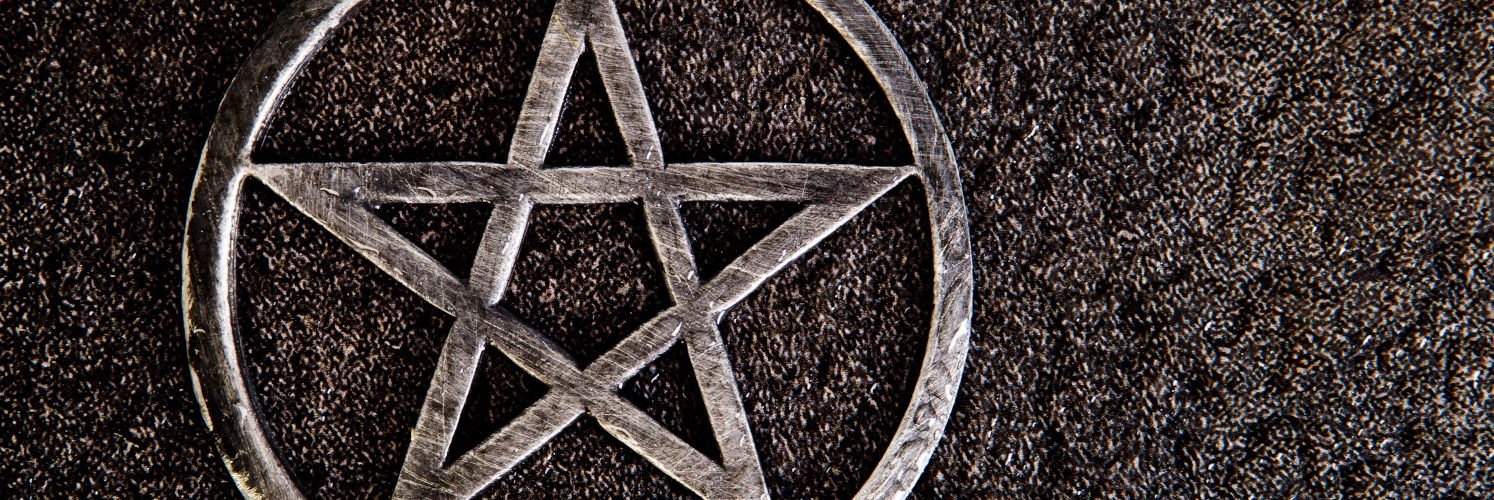There are thousands of titles on Wicca, Witchcraft, Paganism, magick, and the occult from publishers large and small. Some of them are useful to read and refer back to again and again. Some of them are, quite frankly, not worth the paper they’re printed on. And some of them are so expensive as to be useless to all but a privileged few. I wanted to leverage my twenty years of experience in the Craft, both as a practitioner and as a teacher, to list some books that I have read more than once, recommended to my students, and believe stand the test of time. I think that if you’re going to spend money on a book, you should know it’s going to be a good investment. After all, as an inexperienced practitioner building up their reference library, you definitely want quality over quantity.
I’ll admit it. As a younger Pagan I was a book pirate. I hoarded PDFs of pagan and magickal books, some out of print, others just inconvenient to pay for. That was back before I knew the damage book piracy did to the Pagan economy and to my beloved authors in particular. But you know what? I read almost none of those illegally downloaded tomes. The idea of having them was more important than applying myself to learning what was in them. I was a different person then, a lazy armchair priestess. Now I will go out of my way to buy a new book if possible, a used one if necessary. I want my money to support the creation of the content I enjoy. But I also want my money to be an investment in quality knowledge and skills.
When I began teaching students of my own, I went back and re-read a number of the books I’d cut my witchy teeth on. And I was appalled at how dated and irrelevant they were. Very few of the books I started with actually stood the test of time, and the ones that did have value were better suited for historical research than learning how to practice the Craft. Oh, I loved Cunningham and Buckland and RavenWolf, but there was too much pseudohistory and meaningless repetition and ‘no real witch would ever do [insert morally ambiguous thing here]’.
That’s when I realized that the Craft as I learned it, the Craft as I’d grown up with, had changed significantly enough that there was a need for me to see what current writers were saying about the Craft. I needed to become a student again for a little while so I could recommend good books to those who trusted my expertise. So that’s what I did.
One thing I noticed was that after about 2006, every Wicca 101 book that came out was a rehash of books that had come before and offered little if any new information or insights about practicing the Craft. Another thing I noticed is that fifteen minutes of Googling on a Tuesday afternoon will teach you so much more about Wicca as it’s practiced now that it’s almost not worth buying a book dedicated to the subject. We’ve mainstreamed our religion to the point that it’s no longer necessary to purchase niche books to learn the basics about our deities, our celebrations, and our worldview. Many Pagan organizations have the basics of practice on their websites. Pagan bloggers keep readers abreast of conversations happening in the Pagan movement as well as offer targeted education on a variety of subjects. Online mystery schools teach whole traditions’ worth of material. The age of the Wicca 101 book is over.
So where does that leave beginner Pagans? Well, honestly, it leaves them free to chart their own course and find their own path! And that’s where I began making my list of books for inexperienced witches.
Oldies But Goodies
I do not recommend reading the primary sources until you have a firm grasp on Wicca as it is practiced in the 21st Century. I’ll say it again. I do not recommend reading the primary sources until you have a firm grasp on Wicca as it is practiced in the 21st Century. The reason for this is twofold: first, Wiccan practice has changed considerably since it first made its public debut in the 1950s, and second, Wicca is just now old enough as a religion that it’s begun to stabilize into a recognizable system of beliefs.
Now, I’m not saying that the writings of Gardner, Valiente, Crowther, Farrar, Leek, and others are useless. Indeed, they are extremely valuable in understanding the heart of the Craft, and every advancing practitioner should read them. But they are also filled with pseudohistory (which, to be fair, serves as a mythology in its own right) and outdated practices. Until you have a good grasp on the actual history of witchcraft as well as how the religious and magickal system is practiced today, it’s difficult to do a retrospective on early thinkers. For a history of modern pagan witchcraft, I recommend Ronald Hutton’s Triumph of the Moon (to be released in a second edition in early 2021) and Margot Adler’s Drawing Down the Moon (2006).
I would argue that the only exception to this pronouncement are the writings of Doreen Valiente. Valiente, or Ameth as she was known in circle, was the first Wiccan theologian. She had a deep understanding of the heart of the Craft, and that influenced her writings both while she was practicing with Gardner and later when she practiced with others. Her writings have stood the test of time, and I would recommend them to the beginner Wiccan since she was so amazingly influential on the movement — perhaps even more than Gardner himself was.
The Book List
Auryn, Mat. Psychic Witch: A Metaphysical Guide to Meditation, Magick & Manifestation. Llewellyn, 2020. ISBN: 9780738760841.
Auryn bridges the gap between psychic ability and magickal power in this exercise-heavy book that I wish had been around when I was first beginning to practice. Some writers take an outmoded moral high ground and say that psychic development for its own sake shouldn’t be the focus of spiritual practice, but Auryn recognizes that developing your psychic muscles helps strengthen your magickal abilities. Suitable for beginners and advanced practitioners alike, this book is destined to become a classic.
Beckett, John. The Path of Paganism: An Experience-Based Guide to Modern Pagan Practice. Llewellyn, 2017. ISBN: 9780738752051.
Beckett addresses Paganism in a general context and asks insightful questions of the reader to help define the practice the reader wishes to engage in. This is a good book for anyone beginning their practice and still defining what it is they believe.
Curott, Phyllis. Witch Crafting: A Spiritual Guide to Making Magic. Broadway Books, 2001. ISBN: 0767908757.
Curott explains not only the how-to but also the why-do in this guide to basic Craft practices. She breaks out of the Wicca 101 chapter layout by expanding on each aspect of Craft practice, from writing your Book of Shadows to casting spells and celebrating sabbats.
Dominguez, Jr., Ivo. Casting Sacred Space: The Core of All Magickal Work. Weiser Books, 2012. ISBN: 1578634997.
Dominguez expounds upon the essential practice of creating sacred space. This book is rich with information and goes beyond the typical quarters-cast circle to other forms of sacred space such as the triangle of stillness and the square of abeyance. While I recommend it as an introductory text, it is probably not the first book an inexperienced practitioner should read.
Grimassi, Raven. Wiccan Mysteries: Ancient Origins & Teachings. Llewellyn, 1997. ISBN: 9781567182545.
Grimassi researches key aspects of the Wiccan spiritual worldview in this book. I would note that he relies on some historical research that has since been disproven, but since the research forms part of the Wiccan mythological history — the stories we tell ourselves about where we came from and why — I feel that it’s unnecessary to throw the entire book out just because it’s not entirely historically accurate.
Grimassi, Raven. Wiccan Magick: Inner Teachings of the Craft. Llewellyn, 1998. ISBN: 9781567182552.
Grimassi outlines the mechanics of magick in this book. He goes into detail about various energies and how to harness them and gives plenty of historical references (again, some disproven, but still of use to the Wiccan mythological history).
K, Amber. True Magick: A Beginner’s Guide. 2nd Edition. Llewellyn, 2006. ISBN: 9780738708232.
K explains the processes inherent in making magick that transcend sectarian boundaries. She goes into detail about raising and directing energy, casting spells, and tending to your health as a magickal practitioner.
Mankey, Jason. Transformative Witchcraft: The Greater Mysteries. Llewellyn, 2019. ISBN: 9780738757971.
Mankey writes about the how-to of more advanced practices that get glossed over or left to intuition. He explains in-depth the nature of initiations and elevations, as well as rites such as Drawing Down the Moon and the Great Rite, making them accessible for beginners and advanced practitioners alike.
Mooney, Thorn. Traditional Wicca: A Seeker’s Guide. Llewellyn, 2018. ISBN: 9780738753591.
Mooney delves deep into Wicca as a hierarchical, initiatory tradition and demystifies coven work and how to find and join a coven. She expounds on the nature of a coven as a spiritual family rather than a spiritual social club and gives insights into how to know if you’re right for a coven and if a coven’s right for you.
Reed, Ellen Cannon. The Heart of Wicca: Wise Words from a Crone on the Path. Samuel Weiser, 2000. ISBN: 1578631742.
Reed reflects on Wicca as an initiatory, mystery religion and pleads for standards for each of the initiatory degrees. She goes in-depth about two different covens and explains how both of them meet the qualifications to be called Wiccan.
Sabin, Thea. Wicca for Beginners: Fundamentals of Philosophy & Practice. Llewellyn, 2006. ISBN: 9780738707518.
Sabin follows the genre model of Wicca 101 book, but breaks free of rehashing the same old information by offering historical insights as well as detailed explanations and exercises.
Valiente, Doreen. Natural Magic. Robert Hale, 1975. ISBN: 9780719826924.
Valiente goes into detail about the magick inherent in the elements, numbers, colors, and objects like amulets and herbs. She also explains that magick is part of the natural world rather than some supernatural force, which is an important distinction in Wiccan practice.
Valiente, Doreen. Witchcraft for Tomorrow. Robert Hale, 1978. ISBN: 9780709052449.
Valiente goes into detail about a variety of topics, including ethics, gods, divination, and includes a small Book of Shadows which comes complete with a rite of self-initiation.

